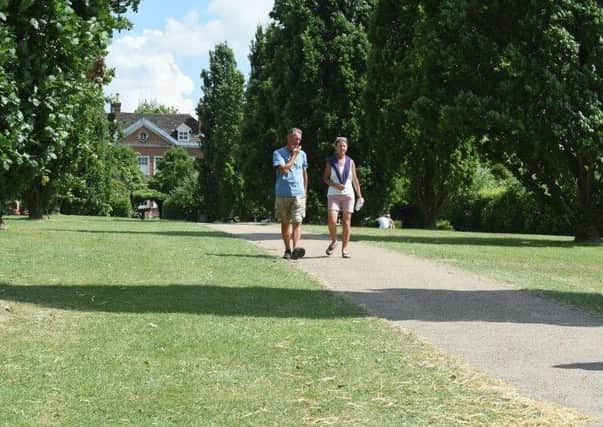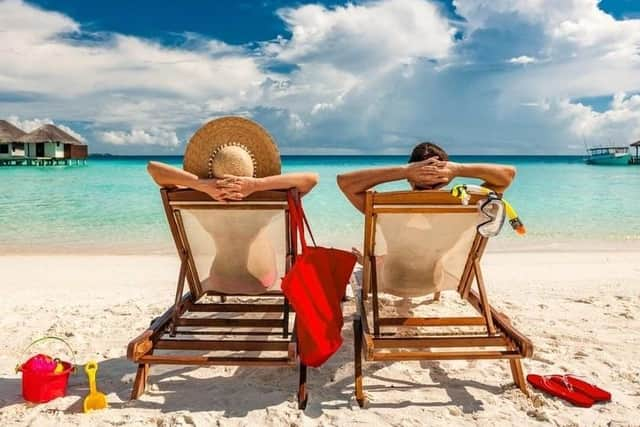Lockdown - and the differences we all face this time around


The lockdown is scheduled to end on December 2, and - though the Prime Minister has said it will definitely end then - there are some who believe it could be extended.
After going into lockdown for the first time in March, much of what’s happening now will feel familiar but there are some differences in how the rules will work this time around.
Advertisement
Hide AdAdvertisement
Hide AdIn some cases, the government has learned from mistakes or taken feedback from the first lockdown on board, whereas some changes are informed by a greater understanding of how the virus spreads.


Here are all the ways this lockdown will differ from the last.
Socialising, exercise and bubbles
One of the main differences this time around is the rules on socialising with people from outside your household.
When the first lockdown came into force in March, you weren’t allowed to meet up with anyone socially.
Advertisement
Hide AdAdvertisement
Hide AdNow, you can exercise outdoors, or visit outdoor public places, with the people you live with, your support bubble, or one person from another household.
Children under 5, and up to two carers for a person with a disability who needs continuous care are not counted towards the gatherings limit on two or more people meeting outside.
Another difference between this lockdown and the last is that many people will now have established support and childcare bubbles, which the government introduced once the initial lockdown measures were loosened.
These will continue to operate in the same way as in the first lockdown
Schools and childcare
Advertisement
Hide AdAdvertisement
Hide AdThis time around, schools, college and universities will not be forced to close, unlike in March.
This doesn’t mean some students won’t be doing some or all of their learning online at some points, due to outbreaks in schools or catch-up tuition, but generally the government wants to keep as many young people in education as possible.
For younger children, nurseries and childcare providers will also be able to remain open.
No holidays
The government has taken the step of banning outbound international travel for holidays, meaning people will not be able to travel for the duration of lockdown.
Advertisement
Hide AdAdvertisement
Hide AdThere is, however, no ban on travelling to England from elsewhere, so people returning from holidays or longer stays abroad are likely to be able to return, but should check with the Foreign Office guidance.
Care home visits
Although there is an obvious need for heightened social distancing and caution when it comes to visiting elderly friends or relatives in care homes, the government has been keen to encourage people to do so during this lockdown.
You will most likely have to see them through a window, or in an outdoor setting, after making arrangements with the home, but the government has said it will help care homes to “provide safe visiting opportunities.”
Healthcare
Experts have said that one of the issues with the last lockdown was that people missed or didn’t try to arrange medical appointments, due to understandable concerns about the virus and the toll on the health service.
Advertisement
Hide AdAdvertisement
Hide AdThis time around, the government has been keen to remind people that they should still attend medical appointments unless specifically told otherwise. There will also be a wider range of healthcare services available, as dentists, opticians, chiropractors and others will be allowed to open as usual.
It’s still worth checking with wherever you’ve got an appointment booked for before attending.
All ‘non-essential’ retail must close but can still offer click-and-collect services - as well as online delivery.
Those which have shut include:
•Clothing shops
•Homeware and furniture stores
•Electronic goods and mobile phone shops
•Vehicle showrooms (other than for rental)
•Betting shops
•Tailors
•Tobacco and vape shops
Hospitality businesses such as cafes, restaurants and pubs must shut unless they are providing food and drink for takeaway before 10pm.
Advertisement
Hide AdAdvertisement
Hide AdAny retailer selling ‘essential’ goods and services may stay open - as long as they follow coronavirus guidelines and make their premises covid-secure.
Those on the list include:
•Food shops, supermarkets, garden centres, hardware stores, building merchants and off-licences;
•Petrol Stations, car repair and MOT services, bicycle shops, and taxi and vehicle hire businesses;
•Banks, building societies, post offices, loan providers and money transfer businesses;
Advertisement
Hide AdAdvertisement
Hide Ad•Medical services such as dentists, opticians and pharmacies;
•Vets and pet shops;
•Agricultural supply shops
Other businesses allowed to open include storage facilities, funeral directors, launderettes, dry cleaners and car parks. Public toilets and motorway service stations are also on the list.
Just a reminder that hair, beauty, tanning and nail salons CAN’T open - or offer mobile services.
In addition, hotels, hostels and guest houses will have to shut - except under specific circumstances.